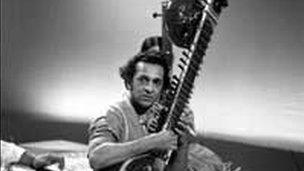Obituary: Ravi Shankar, sitar player and composer
- Published
A look back at the life of Ravi Shankar
Sitar player and composer Ravi Shankar, who has died aged 92, played a leading role in promoting and popularising classical Indian music around the world. He introduced the Beatles to the Indian sounds that informed their later music.
Multiple Grammy Award winner, Shankar was described as "the godfather of world music" by George Harrison, the Beatles' lead guitarist.
Shankar became a superstar in the Western world, but was always drawn back to the revered traditions of the sitar.
Born in April 1920, he spent his early years in the holy city of Benares (Varanasi), in modest circumstances.
The family rarely saw Shankar's father, a prominent lawyer, and when Shankar's eldest brother, Uday, made a name for himself in Europe by forming his own dance company, their mother and the other three boys joined him in Paris.
Indian 'Mozart'
There they mixed with luminaries like the novelist Gertrude Stein, classical guitarist Andres Segovia and the songwriter Cole Porter.
Extracts from Kathakali Katthak, Transmigration and Dhun In Devgiri Bilawal
Touring Europe and North America, Ravi Shankar performed first as a dancer, but was captivated when the virtuoso Indian musician, "Baba" Allauddin Khan, played with the troupe.
Back in India, Shankar dedicated himself to seven years of studying the sitar with "Baba".
"Khan told me you have to leave everything else and do one thing properly," Shankar later said in an interview with the Associated Press.
Shankar married his teacher's daughter and, in the late 1940s and early 1950s, built a reputation for himself as a classical soloist and composer of innovative stage musicals and film scores.
He later received an Oscar nomination for the film, Gandhi.
The violinist Yehudi Menuhin was enchanted by Ravi Shankar's music, comparing his genius to Mozart.
The pair became close friends and together issued three volumes of East Meets West recordings.

Hippie idol: Ravi Shankar pictured in 1967
But it was Shankar's 1966 meeting with the Beatles, and especially Harrison, that was to make him a hippie idol. Harrison had already played sitar on the band's Norwegian Wood. Shankar, who was typically direct, said "it sounded horrible".
Shankar's appearances at the Monterey and Woodstock festivals were not an entirely happy experience. He was disturbed by the drug-taking of the flower power scene and hurt by Indian critics who said he was becoming "Americanised".
Famous daughters
His own doubts that many of his Western audience derived anything meaningful from his music were confirmed at one of the concerts to raise funds for the Bangladesh refugee crisis of 1971, when his three-and-a-half minute tuning session was greeted by an ovation.
Shankar set about rebuilding his domestic audience, performing ancient ragas in traditional form, but also retained his international profile.
While living with his second wife in San Diego, he enjoyed the blossoming talent on sitar of his daughter, Anoushka, with whom he played on tour.
Ravi Shankar teaches George Harrison the sitar
But it was the daughter from an earlier relationship, the multi Grammy-winning singer Norah Jones, who claimed more attention.
Shankar continued to be a bridge between East and West right into his 80s. More precious to him, though, were the traditions of India: yoga, dance, the philosophical ideas and, above all, the music.
His last performance was with Anoushka on 4 November in Long Beach, California, to mark his 10th decade.
- Published12 December 2012